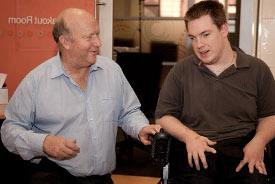Working
Here are some things to consider when preparing to get a job or once on the job.
Preparing to get a job

If you need to change jobs, find your first job or return to work, either an occupational therapist or a psychologist can support you to find something that best suits you. They need to know about your background, present skills, interests and goals. The psychologist will ask you about your behavioral strengths and find areas where you may experience some difficulties. This information will help the occupational therapist or the psychologist suggest what you need to do to get that new job.
A job has to fit in with what you can physically do. An occupational therapist or a physiotherapist can assess your maximum ability to:
- lift
- carry
- sit
- stand
Once this assessment is done, the occupational therapist or physiotherapist will discuss what work tasks are most suitable for you.
A physiotherapist can suggest exercises to increase your flexibility and strength. You can talk to an exercise physiologist about your goals at work and you will get exercises to increase energy and fitness.
It can be confusing to go through the maze of job-seeking agencies and services. An occupational therapist or a social worker can guide you in doing transition to work programs, approaching disability employment agencies, applying for jobs and going to job interviews.
Applying for jobs and going through an interview process can be challenging and at times may lead to some stress and anxiety. Psychologists can teach you strategies for recognising stress and using strategies to keep you calm.
On the job
Workplace coaching
If you are uncertain about how to start a new job, a social worker or a psychologist can provide coaching to guide you. Starting a new job can mean meeting new people who may not understand your disability. If you choose to disclose your disability at work, you can talk with a psychologist about how to feel comfortable talking with others about your disability.
Communication skills
A speech pathologist can work with you to develop your use of speech and/or other methods such as a communication aid. A speech pathologist can also assist you to develop your reading and writing skills and communication skills to support you in the workplace.
Injury prevention
You want to make sure that you do not get any injuries while at work. A physiotherapist or an occupational therapist can suggest good posture and body movement. The occupational therapist can advise you on safe work practices.
Workplace modifications

Modifications are sometimes needed in the workplace to make it accessible. Workplace modifications could include:
- changing the arrangement of furniture
- equipment such as a height-adjustable desk, portable photocopier or phone headset
- making your computer accessible
- changing the doorways or door openings
An occupational therapist will support you to get these workplace modifications done.
A speech pathologist can advise you and your employer about any modifications needed to your work tasks or environment to ensure that you can communicate effectively.
Mobility is very important in the workplace. Therapists can offer support in terms of devices to use and exercises to do.
Workplace bullying and stress
Sometimes you might think that people are bullying you. You might be stressed about how you are doing your job. A psychologist or a social worker can talk with you and support you so that you can enjoy your work.
Fitness at work
You might be exhausted by the time you get to work. If there are no underlying reasons for your fatigue, an exercise physiologist can provide you with exercises and advice about how to improve your general fitness and make it feel easier to get through the day. This includes simple activities you can do at work so your muscles remain strong and flexible.

